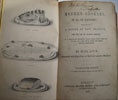Modern Cookery
In all its branches; Reduced to a system of easy practice, For the use of private families. In a series of receipts which have been strictly tested, and are given with the most minute exactness. By Eliza Acton. Illustrated with engravings on Steel and numerous Woodcuts. Fourteenth Edition to which are added directions for carving. London: Longman, Brown, Green, and Longmans, Paternoster Row. 1853.
8vo. Half Title. Frontispiece. Title Page. Dedication Page. [1] p1. Preface. [viii - xlviii] 8 plates. (plate 1 is the frontispiece) [1] 2-608 plus 18 pages of advertisements. Half tan calf, green cloth boards with tan calf corners and gilt lines. Spine with raised bands and gilt lines, 2 black labels with gilt lettering. Some even browning and a some foxing through-out, overall an OK copy.
- Elizabeth 'Eliza' Acton, an English poet and cook, produced and aimed this cookbook at the domestic reader rather than the professional cook or chef. In it she introduced the now-universal practice of listing the ingredients and suggested cooking times with each recipe. Isabella Beeton's bestselling 'Book of Household Management' of 1861 was closely modeled on it. Elizabeth David rated it one of the best nineteenth century cookery books, and television cook Delia Smith is quoted as having called Acton "the best writer of recipes in the English language". 'Modern Cookery' long survived her, remaining in print until 1914 and available more recently in facsimile reprint. Acton was born April 17th 1799 in Battle, Sussex, the eldest of the five children of Elizabeth Mercer and John Acton, a brewer. The family moved to Suffolk shortly after her birth, and there she was raised. At the age of seventeen she and another woman opened a school for girls in Claydon, near Ipswich, which remained open for four years. Her health was precarious and she spent some time in France where she is rumoured to have had an unhappy love affair. She published her Poems in 1826 after returning home and they enjoyed some small success. She subsequently published some single, longer poems, but it was her 'Modern Cookery' of 1845 that garnered her the widest acclaim. Shortly after its publication she relocated to London, where she worked on her next and final book, 'The English Bread Book' of 1857. Along with recipes and a scholarly history of bread-making, this volume contained Acton's strong opinions about adulterated and processed food. Acton, her health never strong, died in February 13th, 1859, and was buried in Hampstead, North London.





click on image to enlarge

Antiquarian category
ref number:
10911